Jeff Matthews, leader of the Chicago Swing Katz recently wrote to me “Something occurs to me about jazz club devotees these days. Sadly, most are 70 plus and some considerably older. This is mirrored around the clubs wherever you go. In the next five years a vast swathe of that loyal audience will disappear. Actually a more serious situation than the problem of ageing musicians. This has to be addressed.”
Having recently posted the item “Jazz Clubs & Ageing Fans”, this is currently very much on my mind. So Jeff’s comments stirred me into an interview with Brian Smith which I had intended to complete some time ago. Known as “Smiffy” to his friends, and for me an unsung Jazz Hero, Brian founded and manages The Peartree Jazz Club in Welwyn Garden City.
Peter Butler: Smiffy, tell us a little about your background and what got you into jazz.
Smiffy: I was born in The Long Arm and Short Arm pub in Lemsford Village just outside Welwyn Garden City, long enough ago to have followed some of the great jazz bands on the 1950s and 60s. Those were the days when Hatfield, Potters Bar, Enfield and Welwyn Garden City were hot beds of jazz. Terry Lightfoot and Acker Bilk used to live in Potters Bar. Bernie Tyrrell led the Salisbury Stompers in Barnet (the pub is now a Sainsbury’s).
PB: So you first got into jazz back then?
Smiffy: Yes. At two venues in particular, The Red Lion in Hatfield and The Cherry Tree Club in Welwyn Garden City. Sadly the Cherry Tree was demolished some years ago to give way to what is now a Waitrose Supermarket and The Red Lion no longer does jazz.
PB: I understand you “dabbled” in promotion back then.
Smiffy: Yes, at The Cherry Tree. But not so much jazz promotion as popular entertainment.
PB: You’ve told me your experience back then has a bearing on your thoughts now but I’ll come back to that later. Let’s skip to the 1990s because I believe that then The Long and The Short Arm hosted jazz sessions.
Smiffy: Yes, jazz came back to Lemsford Village, just outside Welwyn Garden City. Your and my good friend Bob Thomas launched weekly gigs there for his own band, Bob Thomas & The Thomcats, and a number of guest bands. It proved highly successful for a good ten years or more. But then the brewery switched landlords twice and jazz was ousted from the pub.
PB: Jazz ousted from your local, the pub you were born in! So yet again the fans had nowhere to go. But you decided to do something about that?
Smiffy: That’s right. I asked other pubs in the vicinity if they were willing to stage jazz and that’s how The Peartree Jazz Club got started about three years ago. The Peartree Public House is pretty central for Hertfordshire fans, located in Hollybush Lane, Welwyn Garden City, where we now hold jazz gigs on the third Monday of each month.
PB: Out of your own pocket? Does the entrance fee cover your costs?
Smiffy: It’s not easy but I love jazz and the fans missed it. Football once a week was expensive enough so I’ve given that up! I chose a Monday because most people don’t have anything else on that night. Entry is £7 a night but I’ve now set up a club membership at £5 a year whereby members will still pay £7 but non members will be charged £8 or more depending on the band. That should help to build up attendance and takings to cover costs and might even fit in with my plans to move to two sessions a month later this year.
PB: What do you think it would take to attract fans from a wider catchment area and get more bums on seats?
Smiffy: Quite frankly big name bands but they are few and far between now. Terry and Kenny are gone. A club like The Peartree couldn’t afford them anyway.
PB: But let me come back to your experiences in your earlier days in promotion. You mentioned to me once a magic formula which worked back then.
Smiffy: Yes. I wanted to boost popular entertainment attendances at the Cherry Tree in Welwyn Garden City. I wanted a big name comedian who the local press would headline because I thought that would bring out the fans. Through contacts and good fortune I was able to book Bernard Manning at a concessionary rate. So then I didn’t need to advertise the event. The local press did that for me and the Cherry Tree was packed full to bursting that night. I even made a small profit.
I’d love to do the same for jazz at The Peartree before it’s too late, but who have we got left? Chris Barber’s band, or perhaps Kenny Ball’s Jazzmen now led by Kenny’s son Keith. Or Bill Kerr’s Whoopee Jazz Band. Terry’s daughter Melinda is continuing the Lightfoot tradition along with his grandsons. We could double bill with a more local band. That would bring the fans out and hopefully help increase club membership.
PB: But we’re still talking about older fans, and as my pal Jeff Matthews put it, in the next five years a vast swathe of that loyal audience will disappear. How about younger bands?
Smiffy: Well, you and I have been working on that, but haven’t been able to follow up on our leads so far due to recent commitments the musician we’ve been talking to has taken on.
PB: That’s right. Unquestionably there are a number of younger bands out there with solid fan bases in their own age groups. But they are mainly in London, Liverpool and other hot locations. Getting them to play to older fans at jazz clubs like The Peartree wouldn’t be easy. Plus they would want and deserve good money.
Smiffy: As your pal Jeff put it, older audiences might like to see young musicians in older bands but they also prefer bands that are generally around their own ages.
PB: Not much hope there then for the future of New Orleans jazz?
Smiffy: I think it’s going to take more than a small club like The Peartree to ring the changes, but I would still be willing to play a part and give it a go. If we could beef up membership and enthusiasm we might yet be able to book younger bands who might even bring along some to their own fan base. With the right publicity we could even attract University of Hertfordshire students. That would liven up our old faithfuls! But would it put them off? Somehow I don’t think so.
PB: If Hemsby last year was anything to go by you’re right. The Rich Bennett Band, average age around 33, were booked to star at the Autumn Parade. But you could tell the organisers were wary of how they would be received from their announcements on the preceding day. They need not have worried. The “elderly” fans took this dynamic young band to heart and swarmed to the stage to meet them after their sessions. Their CDs sold like hot cakes.
Smiffy: I’ve heard that the idea of a Festival for younger bands has been broached on your Facebook Jazzers Group.
PB: Yes, it would be great if that could be followed up.
Smiffy: I hear you were at the 100 Club recently for a session with The Martyn Brothers Band.
PB: Yes, early in April. The Martyn Brothers, another younger band. Bob Thomas came along with me and Sammy Rimington guested with them. To see him playing alongside Adrian Cox on clarinet and sax was inspiring. Bob spoke to Adrian and compared him with Bruce Turner which he took as a compliment.
Smiffy: The trouble is these younger bands build up fan bases and promote themselves via Facebook etc very successfully. Their gigs are alive with LindyHop and Swing dancing. What you and I have been talking about is luring all this further afield – even into the provinces and, dare I say, beginning with centres like Welwyn Garden City.
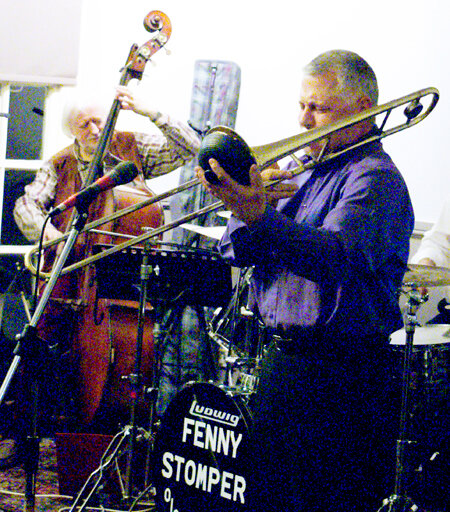
Trefor Williams and Richard Leach guest with The Fenny Stompers at The Peartree Christmas gig, December 2012
PB: I mentioned the thought of a Festival for younger bands to Sammy Rimington but that some had suggested older band(s) should also be involved to guarantee punters. Sammy didn’t think much of the idea of including older bands but suggested prominent guest musicians could be invited to play with the younger bands.
Smiffy: You and I have been talking about all this for the last six months. I’d love to play a part and get The Peartree involved. After all, Welwyn Garden City is within easy striking distance of London. But the big hurdle would be finance. We are still building up the Peartree’s fan base but currently its still nip and tuck. I’m getting calls from a good many bands now wanting to play at the Club. I’m the first to admit they are well worth their asking price, but without a strong fan bass I can’t afford to pay the big names top whack.
But wouldn’t it be wonderful if we could break the “ageing cycle” and get the youngsters involved again! As your pal Jeff said, “this has to be addressed”!
Photos © Peter M Butler, Jazz&Jazz
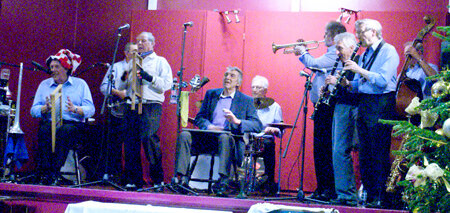
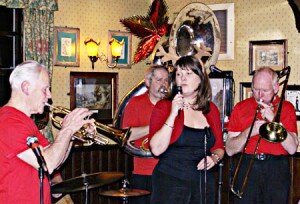
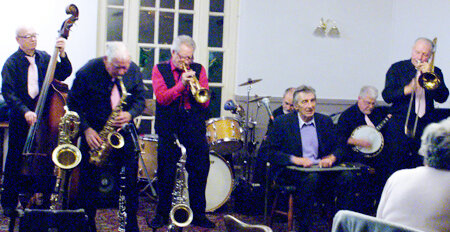
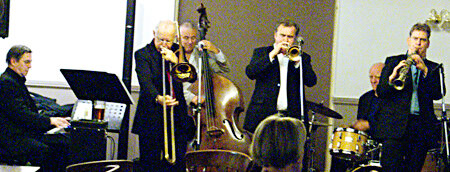
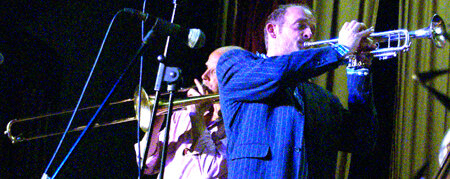
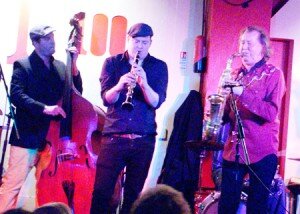
Thank you for the mention in this interview. May I ‘hone’ in on what I think we should concentrate on in the immediate future. The Audience. Our traditional jazz audiences are loyal, enthusiastic and greatly appreciated. Without them, traditional forms of jazz would not have survived this long. But, time takes it toll on all of us and therefore on our audiences which tend to be older anyway. Putting on bands which are much younger is fine but our audiences also know what they like and they follow jazz where it is played the way they want it. If that is played by a younger band it will work well. But – it is the same audience! That is the current difficulty. We need to expand and continuously promote to find new audience members. This is marketing. Established older bands do not, in my opinion, need to be targeting 20 years olds. We can promote to those who are 50 plus. At that 50 year old age bracket people often become more interested in music which is not influenced by the pop industry. They may also become more open to the history of the music too. Why are younger bands successful – Bennet Brothers, Adrian Cox, Shirt Tail Stompers and others? Because they not only play to the existing older age group already found in clubs around the UK, fans of the trad and revivalist eras, but they also heavily promote to the younger set, 20 year olds, especially in London. Young people are interested in high energy dance music which is also dynamic and entertaining and different, even slightly eccentric. They are already creating the audiences of the future. 20 year olds grow into 50 year olds. They play to their age group in the main. Existing older bands should promote to their age group. But I believe it is all about, in the main, marketing a good entertaining product to ALL ages. Lets not discriminate about what age of bottom we want on a seat. We can’t afford to do that. All comers welcome! Young dynamic bands and older established bands working together to promote, to their available market and introduce new people to this life filled music – of all ages! That is what we want. In my opinion that is how the new audiences will arrive at our gigs. It is not so much about the age of the band but rather the longevity of the audience. If the audience is available, younger musicians will be attracted to it. New young bands will start automatically. Younger musicians will join older established bands. Lets discuss how we start to find new audience members. How do we persuade the new ‘older’ audience member to come to clubs and gigs. How do we inform potential audience members about our existing clubs and gigs? How do we recruit our existing audiences into a new promotional force? ‘Bring along a new member and pay half price admission?’ The old methods through radio and tv are withheld from us in the main. But there are new more effective ways never before offered. Older bands may be able to, and may want to learn these new marketing methods from the new younger bands. New bands have new ideas, new methods – new audiences. That’s what we all want in the end. A replenishing audience to love our music – regardless of age.
Excellent points, Jeff, and I’ll emphasise as a key point: “Young dynamic bands and older established bands WORKING TOGETHER to promote to their available market and introduce new people to this life filled music – of all ages!”
The one thing, actually there are several things, that never fails to amaze me is that the age group that our type of Jazz attracts in the main will quite happily spend 3 or 4 times the admission at a bingo club. I’m not one who goes to bingo but used to go with my ex wife many summer’s ago and we never got much change out of forty quid per visit and I imagine that after 20 odd years that cost has increased. We never won enough to have ended up in front over that time so really we just went out for a very expensive couple of drinks. The core of club bands in the early days were semi pro musicians with day jobs and were only too happy to play for the door/raffle and tin money and the punters still think that way. Bands rarely get a couple of free pints in the UK and transport costs make gigging out of one’s local area limited. There are a lot of very talented youngsters out there and I fear that without support and sensible admission prices it’s all gonna grind to a halt…
I’d like to think the interview with Smiffy and comments like yours, Syd, and Jeff’s – and any others who will might add their thoughts – could bring some clear thinking, action and positive results.
I have my tv on and at this precise moment there is an advert on for Bingo. It is heavily promoted on TV and the Internet. People hope they will win sufficient to survive another week. Jazz and the arts generally don’t hold out that promise. I do believe that even Bingo is suffering a decline in attendance. Of course it too tends to have an older audience.